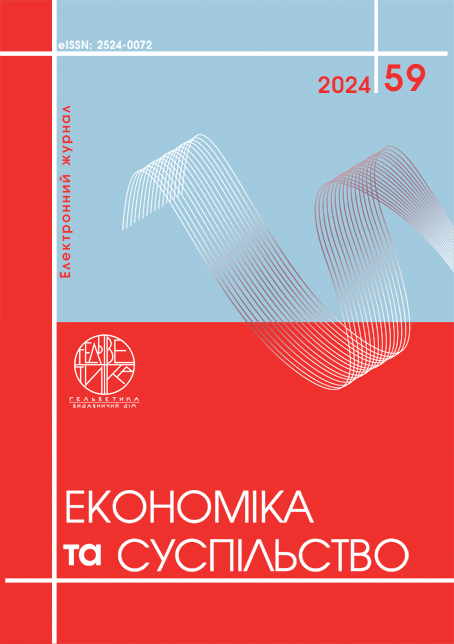DISTANCE EDUCATION TECHNOLOGIES AS A DRIVER OF INTERNATIONAL EDUCATION
Abstract
The scientific article is devoted to the study of distance learning as a driver of international education in modern conditions of international education. The conceptual and categorical apparatus in the field of distance learning technologies as a method of obtaining international education is presented, in particular, the concept of "distance education" is defined, the features of distance learning and, accordingly, international education are given, and the general characteristics of distance learning technologies are also indicated. Distance education is studied as a territorially separated study of the student from the teacher; the possibility of an educational institution to independently determine the organizational and legal basis for distance learning: methodical recommendations; discipline structure, etc.; the possibility of using more technical means of education, for example, the possibility of sharing presentations, showing fragments of the text, discussing all the details of the subject of a lecture or seminar through an online video conference, etc. Peculiarities of practical application and normative regulation of distance education in Ukraine and foreign countries, in particular during the legal regime of martial law in Ukraine, have been studied and determined. The study of global trends in the development of modern distance learning technologies is analyzed. Technologies and ways of implementing distance education are given, in particular, the use of Zoom, Skype or any other platform for direct virtual conferences. The features of obtaining education in Ukraine through the use of distance technologies are correlated with the features of obtaining international education remotely. Disadvantages of distance education in Ukraine are highlighted and ways to improve it in comparison with international experience are suggested. It has been established that distance education is an effective way of attracting more and more people to education without territorial and time boundaries with the possibility of studying in any country of the world while staying at home, and therefore distance education deserves the title of an effective driver of international education, which every year acquires popularity in more and more countries of the world.
References
Корсунська Н. О. Дистанційне навчання: підходи до реалізації / Н. О. Корсунська // Сучасні інформаційні технології та інноваційні методики навчання в підготовці фахівців: методологія, теорія, досвід, проблеми : зб. наук. праць. Вінниця, 2000. С. 29–32.
Shale D. Toward a reconceptualization of distance education / D. Shale // The American Journal of Distance Education. 1988. Vol. 2(3). P. 25–35.
Keegan D. Foundations of distance eduction / D. J. Keegan. London and New York : Routledge. 3rd revised edition, 1996. 224 p.
Keegan D.J. On defining distance education / D. J. Keegan // Distance Education. 1980. № 1(1). Р. 13–26.
Онлайн-освіта вже даність: як покращити якість дистанційного навчання. Українська правда. URL: life.pravda.com.ua/columns/2021/02/18/243971/#:~:text=У%20розпал%20COVID-19%20карантин,педагогів%20був%20досвід%20викладання%20онлайн (дата звернення: 23.01.2024).
Distance learning in the world. Worldscholarshub. URL: https://worldscholarshub.com/uk/universities-with-distance-learning-in-the-world/ (дата звернення: 23.01.2024).
Polianovskyi H., Zatonatska T., Dluhopolskyi O., Liutyi I.Digital and Technological Support of Distance Learning at Universities under COVID-19 (Case of Ukraine). Revista Româneas căpentru Educaţie Multi dimensională. 2021. № 13 (4). Р. 595–613.DOI: https://doi.org/10.18662/rrem/13.4/500 (дата звернення: 23.01.2024).
Rebukha L., Polishchuk V. Ukrainian Society and Сovid-19: the Influence of the Pandemic on Educational Processes in Higher School. Postmodern Openings.2020. No 11(2).Р. 120–127. DOI:: https://doi.org/10.18662/po/11.2/165 (дата звернення: 23.01.2024).
Осадча К., Осадчий В., Спірін О., Круглик В. Реалізація індивідуалізації та персоналізації навчання засобами MOODLE. Молодь і ринок. 2021. No 1 (187). С. 38–43. URL:http://mir.dspu.edu.ua/article/view/228274/227419 (дата звернення: 23.01.2024).
Korsunska N. O. (2000) Dystantsiine navchannia: pidkhody do realizatsii / N. O. Korsunska // Suchasni informatsiini tekhnolohii ta innovatsiini metodyky navchannia v pidhotovtsi fakhivtsiv: metodolohiia, teoriia, dosvid, problemy : zb. nauk. prats. Vinnytsia. S. 29–32 (in Ukrainian).
Shale D. (1988) Toward a reconceptualization of distance education / D. Shale // The American Journal of Distance Education. Vol. 2(3). P. 25–35.
Keegan D. (1996) Foundations of distance eduction / D. J. Keegan. London and New York : Routledge. 3rd revised edition, 224 p.
Keegan D.J. (1980) On defining distance education / D. J. Keegan // Distance Education. № 1(1). R. 13–26.
Onlain-osvita vzhe danist: yak pokrashchyty yakist dystantsiinoho navchannia. Ukrainska pravda. [Online education is already a given: how to improve the quality of distance learning. Ukrainian Pravda]. URL: life.pravda.com.ua/columns/2021/02/18/243971/#:~:text=U%20rozpal%20COVID-19%20karantyn,pedahohiv%20buv%20dosvid%20vykladannia%20onlain (accessed: 28.12.2023) (in Ukrainian).
Distance learning in the world. Worldscholarshub. URL: https://worldscholarshub.com/uk/universities-with-distance-learning-in-the-world/ (accessed: 28.12.2023).
Polianovskyi H., Zatonatska T., Dluhopolskyi O., Liutyi I. (2021) Digital and Technological Support of Distance Learning at Universities under COVID-19 (Case of Ukraine). Revista Româneas căpentru Educaţie Multi dimensională. № 13 (4). R. 595–613. DOI:https://doi.org/10.18662/rrem/13.4/500 (accessed: 28.12.2023).
Rebukha L., Polishchuk V. (2022) Ukrainian Society and Sovid-19: the Influence of the Pandemic on Educational Processes in Higher School. Postmodern Openings. No11(2). R. 120–127. DOI: https://doi.org/10.18662/po/11.2/165 (accessed: 28.12.2023).
Osadcha K., Osadchyi V., Spirin O., Kruhlyk V. (2021) Realizatsiia indyvidualizatsii ta personalizatsii navchannia zasobamy MOODLE. Molod i rynok. [Osadcha K., Osadchiy V., Spirin O., Kruglyk V. Implementation of individualization and personalization of learning by means of MOODLE. Youth and the market]. No 1 (187). S. 38–43. URL:http://mir.dspu.edu.ua/article/view/228274/227419 (accessed: 28.12.2023) (in Ukrainian).

This work is licensed under a Creative Commons Attribution 4.0 International License.


